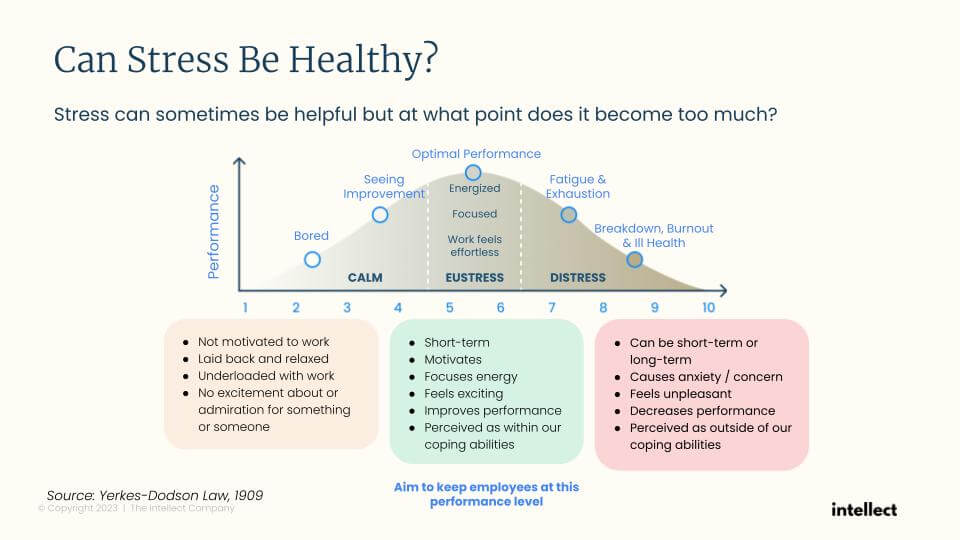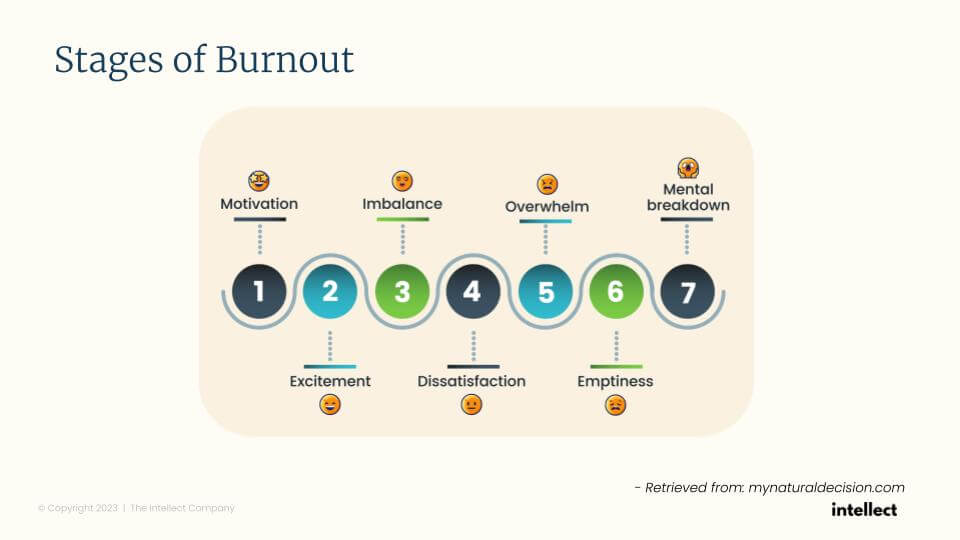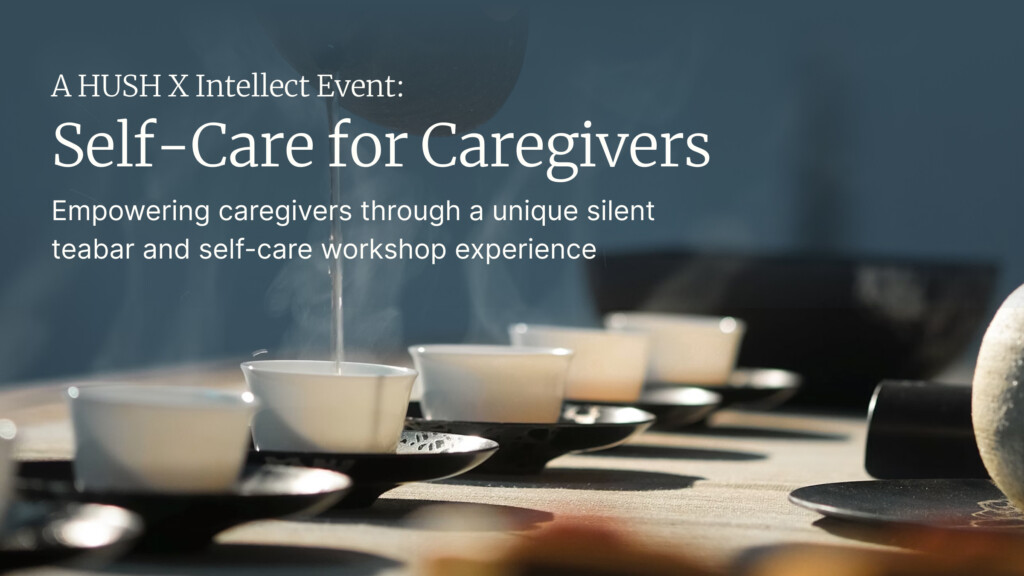Insomnia, low energy, and aches – these are unmistakable signs of a menace that jeopardises our capacity to thrive daily. Even as we put COVID-19 behind us, a plague continues to infiltrate workplaces and communities worldwide – the burnout epidemic.
A healthy amount of stress can motivate us to improve our performance. However, when we transition from a state of eustress to distress, we enter a territory where our coping abilities become insufficient. We risk burning out, compromising not only our mental but also our physical wellbeing.

When it comes to recognising burnout, the bottom line is that the earlier we seek help, the better we can prevent it. While burnout is a slippery slope that worsens if left untreated, we do have access to tools that can help us manage it.
7 stages of burnout
Acknowledging the problem is the first step toward repair. Several debilitating thought patterns, manifested in low mood and energy, are telltale signs of burnout. Those experiencing burnout often feel like every day is a bad day, and the majority of their time is spent on tasks that are either mind-numbingly dull or completely overwhelming. This leads to chronic bouts of fatigue and exhaustion, with no sense of fulfilment or validation.
Of course, the road to burnout is not linear. We may find ourselves in different areas of the spectrum, and it’s normal to move across these stages.

Imagine that you’ve just started a new job and bitten off more than what you can chew. Here’s how your feelings of stress and burnout may escalate.
| 1. Motivation | You’re very enthusiastic about your new job even though there are many roles and responsibilities. |
| 2. Excitement | You’re not as motivated as you were at the start, but you’re still excited about the opportunity. |
| 3. Imbalance | You notice that the workload is high but you’re still coping. |
| 4. Dissatisfaction | You’re unhappy about the workload and want to change your predicament. |
| 5. Overwhelm | You’re inundated by tasks and can’t catch a break as you’d struggle to catch up. without worrying about how to catch up. |
| 6. Emptiness | You’re still overwhelmed but you no longer get work done urgently. |
| 7. Mental breakdown | Your functioning at work has taken a hit. |
Knowing where we are can help us determine the appropriate intervention required. While many only seek help at Stages 6 or 7, it’s advisable to do so at Stages 3 or 4. When we notice an imbalance or dissatisfaction due to a misalignment between our expectations and reality, we can begin to address it with lifestyle changes. Once we find ourselves in the more serious stages of burnout, it is recommended to seek professional help.
Personalities of stress
In addition to pinpointing where we are on the burnout spectrum, understanding our “stress personality” can help uncover the root causes of stress and address them.
| Helper | For the Helpers, stress primarily stems from being others-centred. Setting boundaries induces intense guilt, as they feel everyone depends on them. Consequently, they struggle to find time for themselves and prioritise self-care. |
| High achiever | High Achievers, on the other hand, tie their value to accomplishments, often adopting an all-or-nothing mindset. Their perfectionistic tendencies lead them to never feel satisfied with their achievements. |
| Responsible one | The Responsible One thrives on positive reinforcement and recognition from good work. Their stress arises from the belief that no one else can perform tasks as well as they can, leading them fixate on doing things the “right” way without considering their bandwidth. |
Like other personality assessment tools, we need not confine ourselves to these “stress personalities.” We may embody all three, defaulting to different stress personalities in different settings. Being aware of these tendencies allows us to find a balance.
For example, a Helper may recognise that helping at the expense of their own wellbeing may compromise the quality of support. This mindset shift may empower them to set boundaries without severing connections.
Preventing burnout through internal work
Preventing burnout takes internal work and external changes; accepting stressors beyond our control while optimising our environment for wellbeing. The following coping mechanisms delve into the first half of the equation.
Progressive Muscle Relaxation (PMR)
Relaxation exercises, such as deep breathing and visualisation, can help soothe the nervous system when you’re experiencing discomfort. Progressive Muscle Relaxation (PMR) is a simple exercise in which we tense and then relax specific muscles as a way to calm both the body and mind.

Self-talk
We are harder on ourselves than we are on others, and it’s crucial for us to recognise and counteract negative thoughts as they arise. With that said, our “replacement” thoughts should be balanced, believable, and realistic, lest we fall into the trap of toxic positivity.
| Instead of… | Try… |
| I’ll never be able to do this. | I’m doing the best I can and my best will improve. |
| Others will think I’m terrible. | I didn’t do a perfect job, but I’m pleased with what I got. |
Purpose and meaning
Where do you invest your time and energy? More importantly, what do these commitments do for you? Answering these two questions with tools like this Energy Management Map helps illuminate our core values and beliefs. Knowing why we do what we do – whether it’s switching careers or volunteering for a cause – builds a sense of purpose and meaning that makes our hard work worthwhile.
Preventing burnout through external change
Now that we’ve covered personal psychology, how can we minimise stressors in our environment? The first step is redefining what productivity means to us.
Check your fundamentals
So you’ve read books like The 4-Hour Work, become a master of the Pomodoro method, and installed multiple apps to help you focus at work. Yet, the feelings of stress and burnout haven’t eased. What gives?
While many attribute feelings of stress and burnout to their lack of productivity, there’s more to productivity than checking items off a to-do list. The tools and techniques you’ve picked up are only as effective as the foundation they rest on, composed of the internal work we discussed above and the fundamentals of wellbeing.
Our environment, sleep hygiene, exercise, and nutrition are integral to our daily functioning, yet they’re all too easy to neglect. Has the clutter on your work desk finally gotten to you? Are those sugary snacks doing your concentration levels a disservice? “Auditing” the fundamentals of wellbeing can help you tip these external factors to your favour.
Reach out to coworkers
More often than not, asking “how are you?” gets you superficial answers. Since our co-workers are people we’ve gone through thick and thin with, there’s an enormous opportunity to strengthen our personal connections and bolster workplace wellbeing. As tempting as it is to come together and lament about the stressful aspects of work, it is perhaps more meaningful to use prompts like:
- What are you most excited for this week?
- What did you do to take care of yourself today?
- What made you smile today?
Perform an act of kindness
Receiving an act of kindness fills us with feelings of gratitude, but did you know that offering one can also make us more resilient to stress? The little things, like sharing snacks you bought on vacation with coworkers, bring lightness to an otherwise high-strung environment. Appreciating a team member openly during a meeting takes little to no effort from our end, yet it does wonders for workplace cultures.

Intellect – an end-to-end solution for employee wellbeing
With the burnout epidemic underway, organisations worldwide have ramped up their efforts to protect workplace wellbeing and, by extension, employee engagement. Leading regional and global employers, from Grab to Heineken, are among Intellect’s partners who have benefited from our offerings. That includes the self-guided interventions on our digital platform; coaching, counselling, and psychotherapy sessions; and in-person mental healthcare at Intellect’s clinics.
Click here to learn more about Intellect for businesses.





